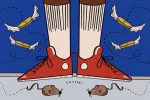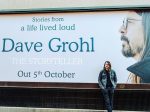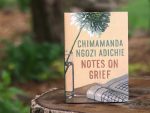In celebration of Pride Month and as a part of my yearly goal to diversify the media I consume, I recently read Saeed Jones’ 2019 memoir, “How We Fight for Our Lives.” Not knowing much about the book beforehand, I was pleasantly surprised by the raw, beautifully crafted story and found myself surprised at its lack of recognition outside of the literary world.
Jones, raised in Lewisville, Texas, shares his story of growing up as a queer Black man raised by a single mother. Through a series of vignettes, Jones guides the reader from summers at his conservative grandmother’s house to college in Kentucky to teaching and writing in New York.
Jones’ Craft
Despite the memoir’s prose form, Jones’ background in poetry is evident. His evocative and poetic writing, which has been recognized with a Pushcart Prize and the PEN/Joyce Osterweil Award for Poetry, shines through in this new form.
Multiple times while reading, I found myself pausing to read paragraphs again to allow their meaning to wash over me. This is not because Jones’ writing is difficult to understand. In fact, it is clear and accessible to people who may not be accustomed to reading poetry. Instead, I took the time to allow myself to sit with the carefully crafted phrases and truly appreciate them.
One line I found myself returning to again and again reads, “Just as some cultures have a hundred words for ‘snow,’ there should be a hundred words in our language for all the ways a black boy can lie awake at night.”
Jones has the unique ability of capturing so much meaning in so few words. This is the type of book you want to sit with. Dedicating enough time to reading ensures the book will sit with you long after you have finished it.
https://www.instagram.com/p/B97uAIOgQRQ/
Fighting to Exist
As the title suggests, one of the main themes of “How We Fight for Our Lives” is Jones’ fight to exist: “Being black can get you killed. Being gay can get you killed. Being a black gay boy is a death wish.” In the memoir, he seeks to understand how this impacted the choices he made as a young man.
The idea of corporeality becomes paramount throughout the text. At a young age, Jones learns of and then experiences the violence inflicted upon Black and gay individuals, as well as experiences the hyper-sexualization of Black male bodies; he learns the many ways his body can be and is co-opted.
In attempt to take back control of his corporeal self, Jones decides to “make a weapon out of [himself].” Sex is how he weaponizes his body. Sex is an act of agency, an act of existence — an act of defiance.
Yet, violent and racist sexual encounters leave Jones to explore the intersection between the body and identity. It must be noted that the text is sexually explicit and there are triggers for abuse.
The body, it seems, is how Jones creates new identities. “Every time I met a man for sex,” he writes, “a new name blossomed in my mouth like a flower I could pull from between my parted lips and hand to a stranger in front of me.” Creating different identities enables him to exist in some capacity.
As the memoir progresses, Jones grapples with becoming who he truly is, instead of donning false identities or changing himself. “People don’t just happen,” he insists. Instead, “We sacrifice former versions of ourselves.” Jones shares his process with the reader. He sheds the version of himself as a person who changes for others, who weaponizes his body, to grow into his identity. Thus, Jones not only fights to survive, but fights to become who he is.
The Power of Words
As a lover of words myself, one of the many themes in “How We Fight for Our Lives” that I particularly appreciated was the power of words.
Words hurt Jones. The racial and sexual slurs flung at him by a variety of people, including the men he has sex with and the first boy he has a crush on, have the power to erase a person, to hide a whole web of identity. Jones grapples with the words his grandmother speaks at church as she prays against his sexuality and his mother’s role in permitting it.
But Jones also uses words to his benefit. A speech and debate scholarship to Western Kentucky University enables him to attend university for free. His mother no longer has to carry the burden of being unable to afford a spot for him at NYU. Books, such as James Baldwin’s “Another Country,” provide queer representation and help Jones understand his sexuality.
Of course, it is with words and the process of writing that Jones finds a place to land, as is evident in this memoir.
https://www.instagram.com/p/CBqJ_culN5R/
A Love Letter
As much as Jones wrote “How We Fight for Our Lives” as an exploration of identity, existence and self, he also wrote it as a love letter to his mother, to whom it is dedicated. Although she is present throughout all four parts of the memoir, she becomes the focus of the final section when he recounts his final experiences with her and her death. This is, without a doubt, my favorite part of the memoir.
Despite her death not being a surprise — Jones shares that she will die within a decade in the prelude — the ending is tender and heartbreaking. The reader has come to know her as a loving and formidable woman. We come to see that while Jones fights for his own life, she fights for her own as she battles health issues.
She also fights for his, working to bring home money to support him while raising him on her own. Jones memorializes her role in his existence in the final line of the memoir. The text becomes a celebration of this woman and who she was, both inside and outside of motherhood.
This is not to say she was perfect. Though accepting of Jones’ sexuality, she seems uncomfortable with it, and his identity. When calling her from college, Jones describes “[erasing himself] so [he] could be her son again.” He finds himself unable to share many aspects of his life with her:
“There was still so much I hadn’t told my mother, so much I knew that I would probably never tell her. I had come out to my mother as a gay man, but within minutes, I realized I had not come out to her as myself.”
With that in mind, I see the memoir as Jones’ way of sharing himself with his mother and of telling her everything he had not shared in the past. This understanding of the text and its beautiful conclusion ties together all of the vignettes that make up his journey.
A Story for All
I started this memoir with the intention of reading a voice whose experiences and identity differ vastly from my own. I value the text for helping me learn about the experience of a queer Black man.
However, I also value it because I found myself relating to aspects of his life and to elements of his coming-of-age story, which he conveyed masterfully.
I believe “How We Fight for Our Lives” contains something anyone can relate to, whether it’s not being able to afford a dream school, feeling disconnected from relatives or finding solace in a library. Jones depicts the human experience with delicate skill and bold honesty that left me wishing his book was longer.
This memoir is one that should not only be read by those hoping to diversify the voices they hear and learn from, but by anyone who wants to read about the pain and beauty of the human experience. Jones’ voice is one that needs to be heard by more people.
I cannot wait to read more of his new work in the future. Until then, I will definitely be picking up his poetry collection, “Prelude to Bruise.”

















